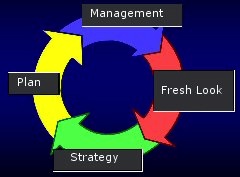Ask the owner of a small-to-medium company about a business plan. Expect the answer: “Business plan? but I’m not a start-up. Why would I want a business plan?
Former president and military leader Dwight Eisenhower once said:
The plan is useless; but planning is essential.
The business planning process is such a great tool for growing a business. That myth of the business plan for start-ups only gets in the way far too often. If you own or run a company, you probably want to grow it. And if you want to grow a company, then you want to plan that growth. And the planning is only the beginning; you want to use the full planning process to manage growth.a business plan as a one-time document, hard to prepare, meant to be read by outsiders, so many businesses miss the real benefit of planning. Like Eisenhower said.
Think for just a minute about how many different reasons there are for an existing company to plan (and manage) it’s growth. There’s the need first of all to control your company’s destiny, to set long-term vision and objectives and calculate steps to take to achieve vision. Without planning the company is reacting to events, following reality as it emerges. With planning, there’s the chance to pro actively lead the company towards its future.
For an existing company that wants to grow, planning process is essential. Everybody wants to control their own destiny. The planning process is the best way to review and refresh the market and marketing, to prioritize and channel growth into the optimal areas, to allocate resources, to set priorities and manage tasks. Bring a team of managers together and develop strategy that the team can implement. Work on dealing with reality, the possible instead of just the desirable, and make strategic choices. Then follow up with regular plan review that becomes, in the end, management.
This normally starts with a plan. The plan, however, is just the beginning. It takes the full cycle to make a plan into a planning process.
(Note: this is slightly updated from a 2006 post.)
 That’s what the allies did, successfully, in the D-Day invasion of Normandy in 1944. That military success was planned and led by Dwight D. Eisenhower, author of my favorite business planning quote (“The plan is useless, but planning is essential.”) It’s what you see in the opening scenes of
That’s what the allies did, successfully, in the D-Day invasion of Normandy in 1944. That military success was planned and led by Dwight D. Eisenhower, author of my favorite business planning quote (“The plan is useless, but planning is essential.”) It’s what you see in the opening scenes of 


You must be logged in to post a comment.